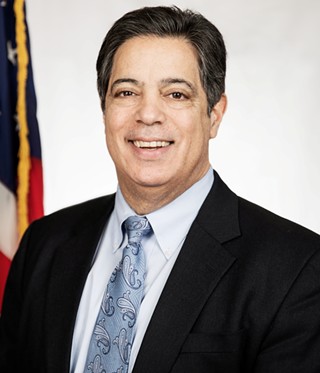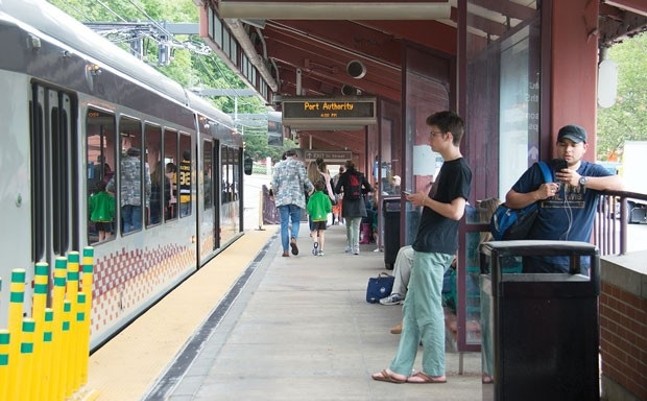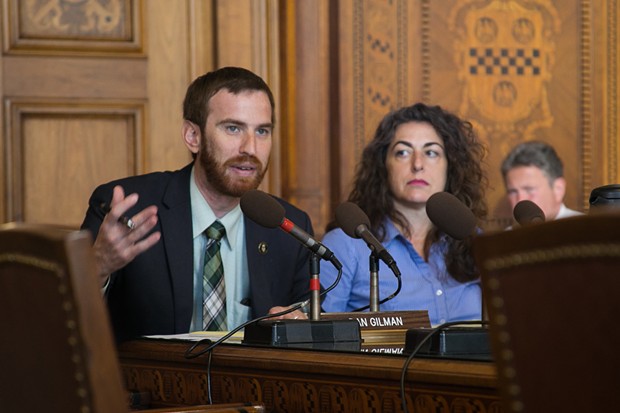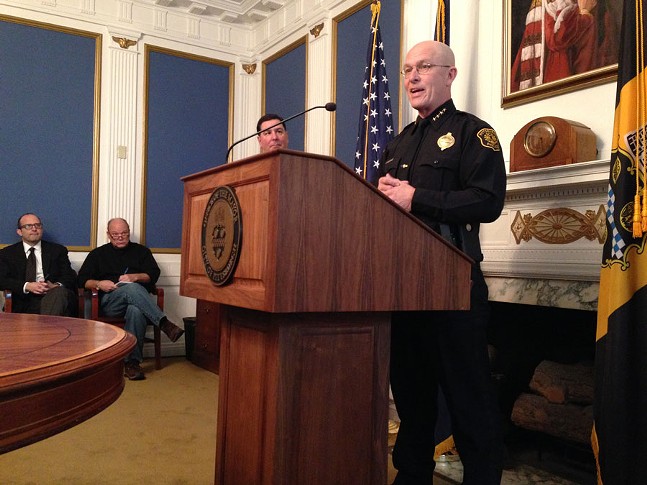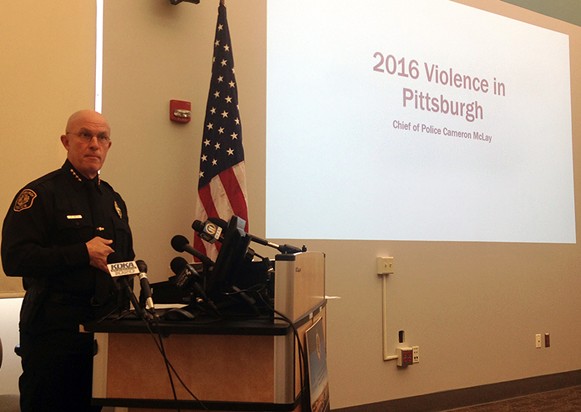Tuesday, July 3, 2018
Now, one of Pittsburgh’s state senators is responding.
State Sen. Jay Costa (D-Forest Hills) will introduced a package of legislation aimed at improving police training at municipal police departments across the state.
“In the wake of tragic officer-involved shootings across the commonwealth, and the nation, I am developing and will be introducing legislation to address these situations,” said Costa in a press release. “I believe it is important that the General Assembly develop and enact legislation that provides improved training for police to know when to use force, particularly deadly force.”
Tags: Jay Costa , Antwon Rose Jr. , Michael Rosfeld , Pittsburgh , East Pittsburgh police , Harrisburg , Pennsylvania state senate , Stephen Zappala , police training , Municipal Police Officers' Education & Training Commission , PolitiCrap , Image
Monday, July 2, 2018
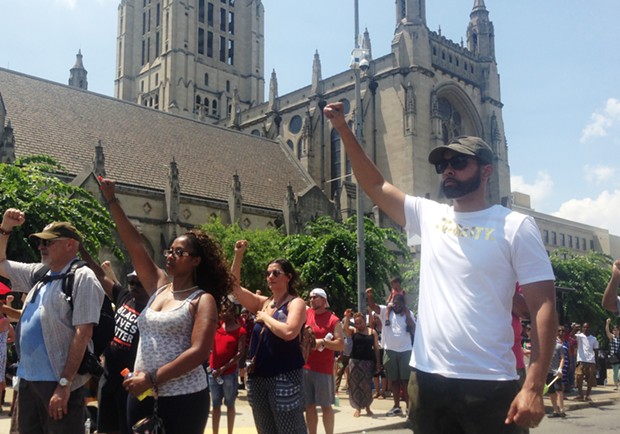
More than 100 protesters shut down an intersection in East Liberty around noon Sunday. It was the latest of about a dozen protests in the wake of the shooting death of Antwon Rose Jr., killed by East Pittsburgh officer Michael Rosfeld on June 19. The Sunday demonstration was focused on the faith community’s role in advocating for the late Rose.
Tags: Pittsburgh , Fourth of July , Antwon Rose , Michael Rosfeld , East Liberty Presbyterian Church , religion , immigration , travel ban , family separation , Donald Trump , East Pittsburgh police , Allegheny County , Image
Monday, April 30, 2018
On top of those local concerns, a municipal court in Cleveland ruled a similar proposal unconstitutional in November 2017.
Then on April 27, Port Authority CEO Katharine Eagan Kelleman announced the authority would no longer be pursuing the fare-check proposal. Kelleman become CEO this year, before the fare-check proposal was introduced.
Tags: Port Authority of Allegheny County , Pittsburgh , Katharine Eagan Kelleman , fare-check , light rail , Port Authority Police , undocumented immigrants , minorities , Pittsburghers for Public Transit , fare evasion , Image
Thursday, October 12, 2017
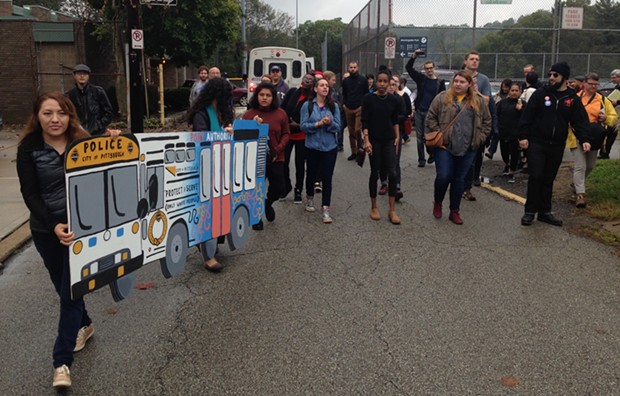
On Oct. 12, a group of 30 advocates marched in Morningside, requesting that state Rep. and Port Authority board member Dom Costa (D-Stanton Heights) reject the fare-check proposal. Gabriel McMorland, of the social-justice advocacy group The Thomas Merton Center, has met with Port Authority officials and spoken at multiple authority board meetings about the potential harm this policy could have on vulnerable populations that often use public transit, like low-income earners, the homeless and undocumented immigrants. Before the march, McMorland said that possibility of putting someone into the criminal-justice system for failing to pay a $2.75 fare is overly punitive.
“They do not appear at all concerned about the potential dangers we brought up,” said McMorland. “We want to stand up against over-policing in this community.”
Nationwide, there are a handful of other transit-police agencies that use armed officers to enforce fare-evasions, such as in New York, Dallas and Cleveland. The policy of Cleveland's Regional Transit Authority is similar to the proposed Port Authority policy, as it makes multiple infractions of fare-evasion a criminal offense. However, recent news reports from Cleveland have highlighted flaws in the RTA system.
In September, the Cleveland Scene wrote about how some RTA transit cops believe that RTA’s fare-check policy is merely a way to generate revenue, and how citations were disproportionately targeting black riders. And in July, TV station WKYC reported how the RTA was charging teenage students with criminal offenses for failure to show their school ID, which acts as their transit pass.
At the Oct. 12 rally, Brandi Fisher, of the Alliance for Police Accountability, worried that if Port Authority were to institute this policy, a minor fare-evasion infraction could escalate, given the oft-tumultuous relationship between minorities and police officers. “Things like traffic stops and pat-downs often escalate to a place where serious things occur, like death or major injury,” said Fisher. She cited the case of Leon Ford, who was severely injured by Pittsburgh Police officers after being pulled over for running a stop sign.
Alma Brigido, the wife of deported immigrant-rights activist Martin Esquivel-Hernandez, told the crowd that this policy will likely decrease ridership among undocumented immigrants, who utilize public transportation because Pennsylvania doesn't allow them to obtain driver’s licenses. “We are obligated to use public transportation in our daily lives.”
As City Paper reported in June, undocumented immigrants could be potentially in threat of deportation with their first fare-evasion infraction. Even though the proposed Port Authority policy prohibits officers to ask for identification, authority officers will still run people’s names through a database that U.S. Immigration and Customs Enforcement has access to.
A coalition of advocacy groups surveyed local Latino transit riders and found that about 80 percent of them would stop taking the T, if the proposal were implemented. Monica Ruiz, of Latino-service organization Casa San Jose, said this is troubling because many Latino residents and many undocumented immigrants live in Beechview and other South Hills neighborhoods which the light-rail serves. Ruiz told CP she spoke to one woman who would stop taking the T if the policy were implemented, and she told Ruiz that armed officers on the light-rail would make her and her children “very afraid.”
The group of 30 marchers ended their march at the office of Costa and delivered more than 300 letters from constituents, asking Costa to oppose the proposed change.
When asked for comment on this story, Costa’s office directed CP’s request to the Port Authority. Adam Brandolph, spokesperson for the Port Authority, emailed CP the following statement: “Interim CEO David Donahoe delayed implementation of the proposed fare policy on our light-rail system in June due to unexpected equipment issues. He has taken that time to review how other transit agencies enforce fare payment, and he has not recommended any changes thus far.”
The date for the Port Authority vote on the fare-check policy has not been determined.
Tags: Port Authority of Allegheny County , Dom Costa , Cleveland Scene , Pittsburgh City Paper , Morningside , Alliance for Police Accountability , Thomas Merton Center , Casa San Jose , Gabriel McMorland , Monica Ruiz , Brandi Fisher , Image
Wednesday, June 28, 2017
Over the past seven years, the events of that January evening have partly centered around whether or not the officers identified themselves. Had the officers recorded the incident with body-worn cameras, arguments over that fact and perhaps several others might've been laid to rest.
Tags: Dan Gilman , Jordan Miles , Scott Schubert , Tom Wolf , police , body cameras , police brutality , Ed Trapp , Wendell Hissrich , John Doherty , Keeping Up With the Council , Image
Thursday, May 18, 2017
University of Pittsburgh professor and well-known policing expert David Harris knows this all too well. For decades, he has been a go-to source for many media outlets (including Pittsburgh City Paper) for criminal-justice stories. He has even testified before the U.S. Congress on the subject.
And with all his available knowledge and expertise, Harris wanted to bring it directly to the the public. So last year, Harris started the Criminal (In)Justice podcast with help from former and current WESA staff members Josh Raulerson and Megan Harris. The first episode aired in March 2016, and this weeks marks the 50th episode.
Tags: David Harris , Criminal (In)Justice , University of Pittsburgh , Image
Friday, November 4, 2016
Earlier this year, members of the Pittsburgh FOP, the officers' union, gave McLay a vote of "no-confidence," however, Mayor Bill Peduto stood behind the chief, our Rebecca Addison reported at the time.
While McLay's last official day is Dec. 4th, he has accrued enough time off that his last day will be Nov. 8 and he will move back to Wisconsin shortly after, to rejoin his family. The reason he gave why this would be his last day: "I wanted to vote."
McLay was hired on the promise of instituting improved police-community relations and made a splash when he held up a sign during Light Up Night 2014 that read "I resolve to challenge racism at work, #endwhitesilence."
At a Nov. 4 press conference announcing his decision, he relayed the message to his former officers that they were on the right track in terms of a forging a positive relationship between police officers and the community.
"To the men and women of the police bureau, stay the course, you are on the right track," said McLay. "Everyone of you are leaders, everyone of you have an ethical responsibility to serve this community."
While McLay denied that the FOP's no-confidence vote influenced his decision to step down, he did communicate that results that can come after someone comes in and tries to make changes. He said that often the person who comes and and "knocks down the silos, usually ruffles the most feathers." McLay said he had been discussing the possibility of leaving the Pittsburgh police with Pittsburgh Mayor Bill Peduto since August. McLay was the first chief chosen from outside the bureau in more than 150 years.
"For everybody, I remind you that change is hard," said McLay. "Everybody wants things to be different and we all resists change, but please understand improvements only come about with change."
McLay believed he was able to accomplish some change, through his office's work forging relationships with activist and faith leaders. When Black Lives Matters protesters took to the streets in July, and the marchers wanted to enter and shut down the parkway, McLay said he was proud to avoid that by speaking with the activist leadership and persuade them to march down Ft. Pitt Boulevard instead, toward Point State Park.
He praised Pittsburgh and became emotional when issuing his send-off: "This is a great city. and it has been an honor to serve you all."
Taking over for McLay in the interim is Assistant Chief Scott Schubert, who has been with the Pittsburgh Police for 24 years. He vowed to continue the community-policing model. "We are not going to stray from our vision," said Schubert. "We believe in it." Peduto said Schubert would serve for 90 days and McLay's replacement will be named after that.
Peduto said that when he hired McLay, they had spoken about how the average term for a police chief was three years and he knew the city "only had him for a short time." Peduto, like McLay, believes that Pittsburgh policing is on the right track.
"We needed a wrecking ball chief to get reform. Now we have the opportunity with an entire new command set," said Peduto. "We are so much closer to getting there because [McLay] was our chief."
10:25 a.m.:
Pittsburgh police chief Cameron McLay resigns, last day will be Nov. 8, Election Day pic.twitter.com/tlpCpjQRvA
— Ryan Deto (@RyanDeto) November 4, 2016
Tags: Pittsburgh Police Bureau , Cameron McLay , Bill Peduto , Scott Schubert , Video , Image
Thursday, October 20, 2016
This is why a group of local, state and national policy-makers is calling for law enforcement to be removed from public school campuses, instead replaced by additional counselors and social workers. The group is part of the Dignity in Schools Campaign and will be discussing these school-arrest issues at a dinner and panel discussion tonight in the Hill District.
The message of the event is written in a press release put forth by the campaign: "Instead of hiring school police, schools should invest in hiring more counselors and training school personnel in these positive approaches, which research shows can significantly improve behavior, decrease suspensions and expulsions and improve academic outcomes."
Speakers include Pittsburgh Public Schools Superintendent Anthony Hamlet, state rep. Ed Gainey (D-East Liberty) and Tanya Clay House of the U.S. Department of Education. Also local rapper and activist Jasiri X will be performing.
The group is demanding that schools across the nation stop arresting minority students; shift funding from police to counselors and “peace builders”; fund measures like positive interventions; enforce the Every Student Succeeds Act; and abolish paddling in schools. The group will also be focusing on decreasing school suspensions, since data from the Department of Education shows that once suspended, students are more likely to drop out.
The event is free and starts at 5 p.m. at the Jeron X. Grayson Community Center
(1852 Enoch Street, Hill District). It's open to public and those interested can register at the group’s Eventbrite page.
Tags: Education Rights Network , One Pittsburgh , Ed Gainey , Anthony Hamlet , Image
Friday, September 30, 2016
In a press conference on Sept. 30, Pittsburgh Police Chief Cameron McLay detailed how community-policing strategies, such as outreach, were effective in lowering these numbers. He said these strategies were particularly effective in the North Side, given that many neighborhoods there saw significant reductions in violent crime.
“We were very targeted at those who were actually causing the violence,” said McLay. “Since most of the offenders there did not actually live there.” McLay said he wanted his officers to only target those committing the crimes. “I wanted to convey [to residents] that ‘We care about you, we love you, we don’t want you to fall victim to violence.’ That is why outreach is important.”
McLay also explained how in the East End, his officers have worked with the Pittsburgh chapter of Men Against Destruction-Defending Against Drugs and Social-Disorder (MAD DADS) over the last year. He said the work has reduced violent activity in East Liberty and Homewood. “We have seen a dramatic decrease in [complaints] in the East Liberty business district,” said McLay. “In the Homewood business district, businesses have reported less loitering and people are feeling safer.”
McLay said the working relationship with the volunteers at MAD DADS helps to increase communication with the community because “some people are not comfortable talking to the police.”
But McLay says there are still many problems to address. Violence rates are still disproportionately higher among blacks, particularly young black men. And McLay says his department will be paying special attention to Downtown, particularly the area around the Wood Street T Station, which has seen a flurry of criminal activity.
Over, McLay said he will continue to institute community-policing strategies and rejects the notion the department needs to be “tough on crime.” He points to the work with MAD DADS in the East End as proof, as crime rates have dropped there.
‘Community policing is crime prevention,” said McLay. “It reduces crime. It is not just a feel-good strategy.”
Tags: Pittsburgh , Cameron McLay , FBI , MAD DADS , Image
Wednesday, August 3, 2016

On the first Tuesday in August of every year, residents from across the nation gather for communal outdoor events to establish stronger relationships between communities and their police force.
This year, in recognition of National Night Out, Pittsburgh’s neighborhoods organized individual community outdoor events and Spring Garden’s, at Catalano Parklet, was particularly bumping.
From 5 to 8 p.m., Spring Garden neighbors gathered at Catalano Park for an evening of hot dogs, grilled vegetables, entertainment and community awareness. Local dance troupe Get Down Gang provided entertainment for neighbors, performing break dance routines.
“I think it brings communities together,” says Allegheny County Executive Rich Fitzgerald. “I think anytime in a neighborhood when you know your neighbors, it’s a healthy thing. It breaks down barriers. There are people with different religions, backgrounds, sexualities.
“These events improve quality of life. Sometimes people get to talk about what they want to do with their neighborhood. Those kinds of neighborhood solutions come up.”
Fitzgerald visited eight neighborhoods Tuesday evening, and said he recognized a commonality among the crowds: they were multigenerational. Night Out events were held at churches, community centers, parks and playgrounds. Organizers often bring in social service agencies and outreach groups to talk about public safety, drug addiction and childcare.
“The neighborhoods are safer when they’re together,” says Spring Garden block watch chair Denise Pierce. “Safer Together is the theme that the city of Pittsburgh public safety department uses, and we find with some of our blighted neighborhoods here — [that's] right where a lot of crime was going around.”
Police officers from the jurisdiction stopped by the Spring Garden parklet throughout the evening. Larry Crawford, police community relations officer, spoke to the crowd briefly, introducing himself to neighbors. There were appearances from Fitzgerald and District 1 Pittsburgh City Councilor Darlene Harris as well.
“We had everybody here. It probably scared people away,” says Raphael Walton with a laugh. Walton and Pierce co-organized Spring Garden’s Night Out event.
“The event was our most successful in terms of the entertainment,” says Pierce. “We were given a budget. We were able to pay [the performers] $200. We were never able to do that before. So in terms of this as an event, and giving multiple things, that dancing really set it apart from any of our other times. It was pretty much a nice summer night, with a little entertainment and good food.”
Wayne Younger, minister at Cityview Church, spoke at the event and praised community gatherings and his neighborhood.
“I just think it’s an important thing whenever the community is gathering, just to be a part of it and to care for neighborhood unity,” says Younger. “To basically get out with the neighbors and find out what moves them."
“I basically gave thanks to the folks who organized the event and talked about what I see as the unique things about our neighborhood,” he says. “It’s a racially diverse neighborhood. People who have means and people who don’t have access live right next door to each other. I also talked with them just about the fact that when we do things like this event and come together across all our different lines, we humanize each other.”
Tags: national night out , public safety , police , Pittsburgh , Image


